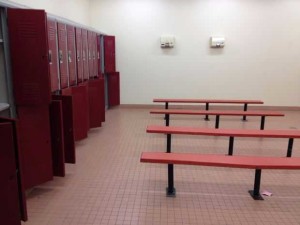 CHICAGO — A federal magistrate has recommended that a district judge reject a request to block an agreement between a Chicago-area school district and the Obama administration that allowed a male student who identifies as female to use the girls’ locker room.
CHICAGO — A federal magistrate has recommended that a district judge reject a request to block an agreement between a Chicago-area school district and the Obama administration that allowed a male student who identifies as female to use the girls’ locker room.
“High school students do not have a constitutional right not to share restrooms or locker rooms with transgender students whose sex assigned at birth is different than theirs,” U.S. Magistrate Judge Jeffrey Gilbert wrote on Tuesday in his report and recommendation.
“In addition, sharing a restroom or locker room with a transgender student does not create a severe, pervasive, or objectively offensive hostile environment under Title IX given the privacy protections District 211 has put in place in those facilities and the alternative facilities available to students who do not want to share a restroom or locker room with a transgender student,” he said.
Gilbert opined that the compromise the school district had reached with the government seemed sufficient to protect the interests of all parties.
“Plaintiffs maintain that the presence of a transgender student in a restroom or locker room with cisgender students violates Title IX because it creates a risk that students will see each other in an unclothed or partially clothed state by virtue of their sharing these facilities, and that is a severe, pervasive and objectively offensive hostile environment,” he wrote.
“The risk of unwanted exposure in this case, however, is substantively mitigated and reduced by the privacy protections that District 211 provides in the restrooms and locker rooms, and by the alternative facilities it provides for students who do not want to use the common facilities,” Gilbert remarked.
The matter now is in the hands of U.S. District Judge Jorge Alonso, who can choose to either accept or reject Gilbert’s recommendation.
As previously reported, two years ago, an unidentified high school student within the Palatine-based Township High School District 211 requested to use the girls’ locker room at at William Fremd High School as he had been diagnosed with gender dysphoria.
But the district declined, citing the privacy concerns of the female students. It in turn offered a private location to change, but the student rejected the accommodation. He then contacted the American Civil Liberties Union, which filed a federal complaint with the Office of Civil Rights of the U.S. Department of Education.
The Department of Education responded by opining that the district had to permit the student to use the locker room of his choice due to Title IX requirements. The two sides continued in talks for a number of months, but the district held firm on requiring privacy for female students while offering various options for the transgender student, which were refused.
It said that it desired to “to protect the privacy rights of all students when changing clothes or showering before or after physical education and after-school activities, while also providing accommodations necessary to meet the unique needs of individual students.”
The Department of Education recommended that the district install privacy curtains in the changing area so that he could not see other students changing and female students could not see him. The district installed the curtains, but as negotiations remained impasse, the department gave district officials 30 days to settle the matter under threat of penalty, including the possibility of the loss of $6 million in federal funding.
The district soon voted to allow the accommodation for the student, but not without much objection from parents. In May, 51 families, representing 73 parents and 63 students, sued the Obama administration over the matter, contending that it is unlawfully distorting and redefined the meaning of Title IX, and is forcing its wrongful interpretation on school districts.
“School policies should protect the privacy and safety of all students, no matter who they are. Young students should be not be forced into an intimate setting like a locker room with someone of the opposite sex,” Alliance Defending Freedom (ADF) senior counsel Gary McCaleb said in a statement following Gilbert’s recommendation. “The court should exercise its authority to stop the DOE and DOJ from redefining federal law and violating the privacy of thousands of students. We are hopeful that the federal courts will ultimately decide in favor of the privacy rights of all students.”
Become a Christian News Network Supporter...


